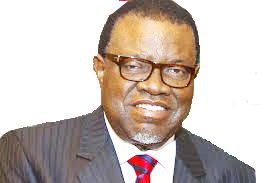Namibia is participating at the World Economic Forum (WEF) annual meeting in Davos for the first time and is using the opportunity to showcase its vast green hydrogen potential, the presidency announced on Sunday.
According to the presidency, President Hage Geingob has joined over 2,000 political and business leaders in the Swiss ski resort of Davos for the 2022 WEF Annual Meeting taking place from May 22-26 under the theme “History at a Turning Point: Government Policies and Business Strategies”.
“Namibia will be attending following an invitation from Klaus Schwab, the Founder and Executive Chairman of the World Economic Forum, to showcase our green hydrogen potential and strategy,” the presidency said in a statement.
It said an invitation to Davos would greatly benefit Namibia, “primarily to showcase the country’s investment potential to global leaders and some of the wealthiest nations and entrepreneurs in the world.”
“Namibia’s presence at WEF underscores the country’s ability to contribute towards setting the international agenda, particularly in the area of renewable energy which underpinned the invitation to the forum.”
Hydrogen has become the latest faze in the global race towards net-zero emissions from energy sources, with a number of countries – most notably Colombia, India, Russia, United Kingdom and United States – recently unveiling national strategies to harness hydrogen as a source of clean energy.
Namibia has massive wind and solar power potential, which makes the southwest African country a potential hotspot for cheap clean hydrogen production.
Hydrogen is seen as a key energy source that will play a major role in helping countries become carbon neutral.
In addition to showcasing the country’s green hydrogen potential, Namibia is also using its participation at the WEF to promote investment in infrastructure, transport and logistics, tourism; agriculture; and oil and gas sectors.
Several high level events have been planned to showcase these sectors to potential investors.
These include positioning the country as a strategic logistics hub serving as a gateway to the Southern African Development Community and unveiling several large infrastructural projects to both domestic and foreign investors.
JN/APA


